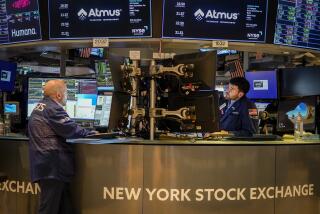Record Trade Deficit Rocks Britain : Government Hikes Interest Rates; Stock Prices Plunge
- Share via
LONDON — The worst set of monthly trade figures in British history forced the government to push up interest rates by a full percentage point and sent a worried stock market into a sharp decline on Thursday.
The government reported a record current account deficit of 2.15 billion pounds ($3.63 billion) for July. Merchandise trade was in the red by 2.65 billion pounds ($4.47 billion).
The grim figures fueled an increasingly bitter political debate over the economy, with charges that the Conservative government, presiding over a long period of strong growth, has not acted fast enough to choke off a boom in consumer demand for imports.
The deficit in July, much worse than predicted, quickly wiped 4 billion pounds ($6.76 billion) off stock market values and the government sought to restore confidence by raising basic interest rates for the eighth time in three months to 12%. The Bank of England raised its money market dealing rate to 12% from 11% in a signal to commercial banks that they should lift their base rate, equivalent to the U.S. prime. The banks quickly followed.
“The economy is experiencing a great deal of trouble,” said Bill Martin, chief British economist at stockbrokers Phillips & Drew. “The British economy is now running wild and free.”
In London, the Financial Times 100-stock index lost 39 points, or just over 2%, to close at 1,780.2 and the pound was hit on foreign exchange markets before recovering. It closed firm in New York, however, at $1.6975, up just over a cent from Wednesday against a sharply weaker dollar.
Way Over Target
The balance of payments shortfall on Britain’s dealings with the rest of the world was twice as big as economists had expected and compared to a revised June deficit of 1.04 billion pounds ($1.75 billion).
This means that for the first seven months of 1988, Britain was in the red by 7.97 billion pounds ($13.46 billion), compared to a government target of a 4 billion pound ($6.76 billion) current account deficit for the whole of 1988.
The deficit on visible trade--food, manufactures and oil--was also a record at 2.65 billion pounds ($4.47 billion) in July, about double a revised 1.54 billion pounds ($2.6 billion) in the previous month.
This was partly offset by Britain’s traditional strong earnings from invisible trade such as banking, insurance and tourism, put at 500 million pounds ($845 million) in the month.
Some economists and the opposition Labor Party blamed big tax cuts announced last March and easy credit for fueling an already strong consumer boom. They believe that raising interest rates too high could dampen crucial investment and hiking taxes are the only way to rein in consumer demand.
But they say Chancellor of the Exchequer Nigel Lawson, Britain’s finance minister, would suffer a political loss of face if he reversed his campaign to cut incomes taxes. Some higher rates have more than halved since the Conservatives came to power in 1979.
Has Applied Brakes
Lawson, in a radio interview, described the figures as unwelcome but said he had applied the proper medicine.
“The economy has been going ahead too fast. It is necessary to apply the brakes and that is what I’ve done,” he said in the broadcast. He ruled out an emergency mini-budget but warned that interest rates would stay at their current level for some time.
Pointing to rising incomes, falling unemployment and higher manufacturing output, he said the economy was strong otherwise and that it would take time for a recent rise in home mortgage rates to take effect.
Bryan Gould, trade and industry spokesman for the opposition Labor Party, said: “Remedial action is urgently needed. The credit boom is out of control. Interest rates are not the answer and a further rise can only make British industry less competitive.”
More to Read
Inside the business of entertainment
The Wide Shot brings you news, analysis and insights on everything from streaming wars to production — and what it all means for the future.
You may occasionally receive promotional content from the Los Angeles Times.










